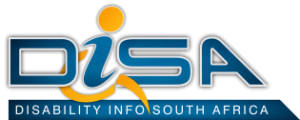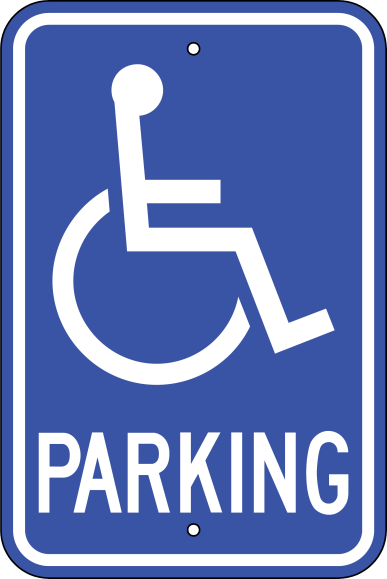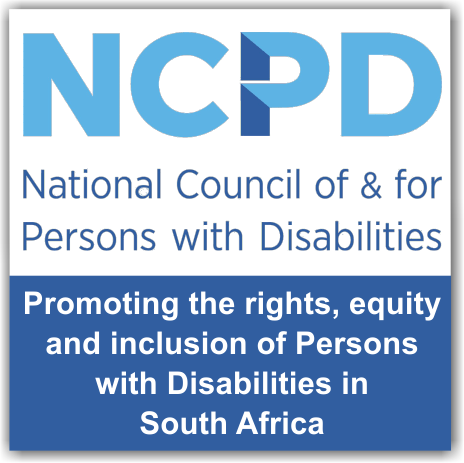Parking Bays & Discs
Introduction
Wheelchair Parking Bays & Disks are for persons who use wheelchairs and drive themselves or who are transported in a vehicle. These Wheelchair Parking Bays are set aside for wheelchair users & Persons With Disabilities. They are not only close to the entrance, but are also wider than the average parking bay, they are traditionally 3500mm wide to cater for a wheelchair user who needs the extra space to enter or exit the vehicle. This extra space helps these transfers to be done safely for the wheelchair user & helps prevent the vehicle in the parking space near by from getting damaged. Persons who use these parking bays need to apply for a Wheelchair Parking Permit, also known as a "Disabled Parking Permit", "Handicapped Permit", "Disabled Placard" or "Disabled Badge", which is displayed on the vehicle upon parking it in one one of these bays.
Who Can Use These Parking Bays?
According to Section 137 of the Road Traffic Act 29 of 1989, Municipalities provide for special parking spaces for people with prescribed disabilities or persons who transport them. These parking spaces can be identified by a vertical sign showing the international symbol for disability, which is also clearly painted on the road surface. The permit allows exemption from street-parking charges in some places and is used to park within dedicated disabled parking spaces reserved for people who have satisfied requirements to receive the placard. If you have a disabled parking disc, you need to display the disc clearly in your windscreen.
- a wheelchair user to transfer into their wheelchair from their car.
- The helper of a person who uses a wheelchair, to park the wheelchair next to the car so that they can lift the person from the car and place them into the wheelchair.
- The helper of a person who uses a wheelchair, to offload a person from a kombi in a wheelchair down ramps or with a wheelchair lift.
Currently a parking disc will be issued for up to five years, after which the applicant must re-apply. These badges are standardized to facilitate recognition and to avoid difficulties at local level. Since 2000, all general disabled parking permits have a common style and blue colour, leading to the officially-used designation “Blue Badge”. Temporary discs are also issued for short-term disabilities (three to nine months), but the same process has to be followed.
If you are a visitor to South Africa & have an international disabled parking permit, this would be acceptable to use for a period up to a month, but if a visitor is staying for more than a month, they should apply for a temporary disabled parking permit.
How do you apply?
Through various municipalities and a number of Organizations, you can apply to, to register and receive a disabled parking disc, these include the National Council of and for Persons with Disabilities (NCPD), an APD in your province or (QASA). Each province has different procedures with regards to the application for parking permits for persons with disabilities.
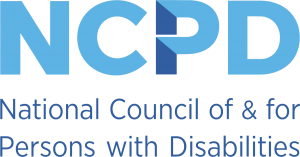 Below are listed the procedures that you need to follow to register a Parking Disk with The National Council of and for Persons with Disabilities (NCPD) or QASA. If you wish to register your Disabled Parking Disc in your province and it is not listed below, we recommend that you contact your local Association for Physically Disabled (APD) or your municipality for the procedures in your area.
Below are listed the procedures that you need to follow to register a Parking Disk with The National Council of and for Persons with Disabilities (NCPD) or QASA. If you wish to register your Disabled Parking Disc in your province and it is not listed below, we recommend that you contact your local Association for Physically Disabled (APD) or your municipality for the procedures in your area.
The National Council of and for Persons with Disabilities
The National Council of and for Persons with Disabilities (NCPD) can also supply information and assist with registering and applying for a Disabled Parking Disk to be able to park in Disabled Parking space. Specially designed and allocated parking bays are set aside for the exclusive use of people with severe mobility impairments. These bays are 3.5 meters wide. Smaller dimensions prevent the person concerned from being transferred to or from a wheelchair. Clearly marked parking spaces, with yellow borders and a wheelchair sign in the middle of the surface, are indicated under the heading Official Road Traffic Signs by the Road Traffic Act. The blue signs with a white wheelchair sign at the top are normally also placed at the front of the parking space. These parking spaces must also be within 50m of an accessible entrance to the building.
QASA
The QuadPara Association of South Africa (QASA) is a non-profit organisation (NPO 000-881) of Quadriplegics and Paraplegics in South Africa. QASA’s mission is “to improve lives by securing resources to advocate, educate, capacitate, support and mobilize”. QASA’s vision is that “all quadriplegics and paraplegics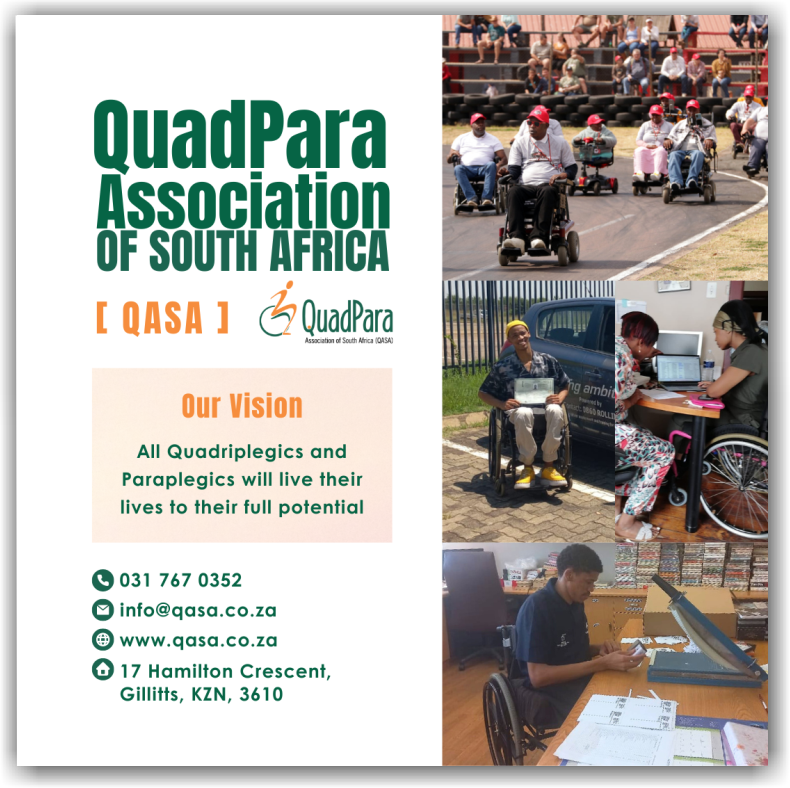 will live their lives to their full potential”. QASA develops products, programmes and services for quadriplegic and paraplegic members to build their capacity and ensure opportunities for societal integration and empowerment.
will live their lives to their full potential”. QASA develops products, programmes and services for quadriplegic and paraplegic members to build their capacity and ensure opportunities for societal integration and empowerment.
These Services include but are not limited to Accessible Parking Permits:
Accessible or Wheelchair Parking Bays & Discs are for persons who use wheelchairs and drive themselves or who are transported in a vehicle. These parking bays are set aside for wheelchair users. They are not only close to the entrance, but are also wider than the average parking bay, to cater for a wheelchair user who needs the extra space to enter or exit the vehicle. This extra space helps these transfers to be done safely for the wheelchair user & helps prevent the vehicle in the parking space nearby from getting damaged.
Persons who use these parking bays need to apply for a Wheelchair Parking Permit, also known as a “Disabled Parking Permit”, or “Disabled Badge”, which is displayed on the vehicle upon parking it in one of these bays.
WhatsApp 073 853 9675 to name and shame parking offenders.
QASA has a dedicated WhatsApp number to name and shame offenders using accessible parking bays in public parking areas across the country. If you see someone misusing an accessible demarcated parking bay, take a photo (include the location, date and time) and send it QASA’s WhatsApp number. Ensure that the vehicle registration is clear and the wheelchair parking sign is visible.
The dedicated WhatsApp number will allow QASA to deal with offenders accordingly and report them to the local authorities to deal with. A fine for parking in an accessible parking space, without the correct accreditation, could be up to R1000.
You can apply to, to register and receive a disabled parking disc from QASA, if you are using a wheelchair on a temporary or permanent bases. You will be required to fill out an application form, which will also need to be completed by your doctor confirming that your mobility is severely impaired by an ongoing physical condition, or that your mobility is temporarily but severely impaired. You will need to download the form on the link below and print it out, once it has been completed by yourself and your Doctor, you will need to e-mail it back to the QuadPara Association of South Africa (QASA) on the following e-mail address: info@qasa.co.za
Once they have received your form they will consider your application and be in contact with you, once your application has been approved. Click the link below to download the form: QASA Parking Permit Application Form 2024 If you need to contact QASA, you can contact them on the following details: PO Box 2368 Pinetown 3600, 17 Hamilton Crescent, Gillitts 3610, Tel: 031 7670352 / 7670348, Fax: 031 7670584, Email: info@qasa.co.za, www.qasa.co.za
Click on the link above to find out more about "Access Audits", or visit our Organizations - QASA Page to find out more about QASA and the other Projects and Services that they provide, or their website at www.qasa.co.za.
Western Cape
If you have a disability, you can apply for a disabled parking disc from your local municipality. This disc allows you to park in disability parking bays and in certain circumstances, it exempts you from parking provisions.
To qualify for a disabled parking disc in this province, you need to have a letter from your doctor confirming that your mobility is severely impaired by an ongoing mental or physical condition, or that your mobility is temporarily but severely impaired.
Some municipalities require the doctor to complete a section of the form, so the form needs to be collected beforehand. The Western Cape Government’s suggests that you contact your local traffic department to confirm whether you require a doctor’s letter or a form.
Please Note: The disabled parking disc issued by any local authority may not automatically be recognised by any other local authority. Click Local Authorities, to view contact details of other municipalities in the Western Cape.
KwaZulu-Natal
In Kwazulu-Natal, the issuing of parking discs for persons with disabilities is regulated by the "The Quadraplegic Association KZN."
Drivers need to apply for an official disabled parking disc. A detailed application process has been developed by the Quadraplegic Association KZN.
The application procedure for an accessible parking disc is as follows:
- All the relevant documents must be completed in full by the applicant, as well as his or her medical practitioner.
- The application should be accompanied by a medical certificate from a registered health professional or an occupational therapist, or physio or medical doctor.
- The applicant must then send the completed documents back to the The Quadraplegic Association KZN, with a certified copy of the applicant’s ID document.
- The disc is registered in the applicant’s name and can be used with any vehicle.
- Once the form has been filled in you can email it to them at: qan@mweb.co.za you can also phone them on: 031 701 7444 or 082 875 2131.
Gauteng
In Gauteng, the issuing parking discs for persons with disabilities is regulated by the Gauteng Provincial Association for Persons with Disabilities (GPAPD).
Drivers need to apply for an official disabled parking disc. A detailed application process has been developed by the GPAPD. The application procedure for an accessible parking disc is as follows:
- Download the application form: GPAPD Application Form or contact your local Gauteng Provincial Association for Persons with Disabilities (GPAPD) to request the application forms. http://www.gpapd.org/index.php/gauteng-provincial-association-for-persons-with-disabilities-contact-us
- All the relevant documents must be completed in full by the applicant, as well as his or her medical practitioner.
- The application should be accompanied by a medical certificate from a registered health professional or an occupational therapist, or physio or medical doctor.
- The applicant must then send the completed documents back to the GPAPD, with a certified copy of the applicant’s ID document.
- The disc is registered in the applicant’s name and can be used with any vehicle.
Once the above is completed an application is lodged with GPAPD, which requires the applicant to appear before a screening panel, who then pursue the final application on behalf of the applicant, with the relevant authorities.
Address: Pallinghurst Road, Gauteng, Westcliff South Africa, Tel No: (011) 8383012 Fax No: 116465248 or 011 425 4025 or Leslie 0724 108 282.
Other Provinces
As mentioned above, if your province is not listed above, we recommend that you contact your local Association for Physically Disabled (APD) for the procedures in your area.
Abuse of wheelchair or disabled parking bays
The misuse of disabled parking permits has been identified as a major problem worldwide. It is not only a South African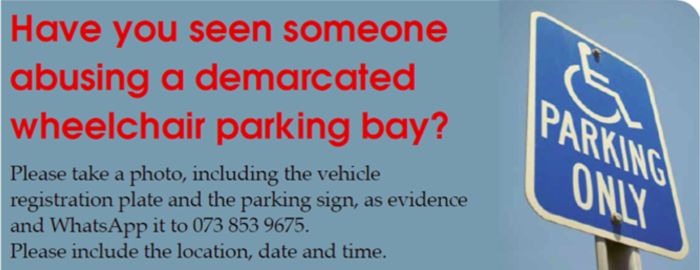 phenomenon. Due to the escalating number of complaints from disabled motorists about their demarcated bays being used by unaccredited drivers, The QuadPara Association of SA (Qasa) has established a WhatsApp whistle-blowing facility for the public to share information on transgressions. Estimates indicate the majority of these disks are used or obtained fraudulently. The convenience of the location, often being close to the entrance areas, is the main reason why they are abused.
phenomenon. Due to the escalating number of complaints from disabled motorists about their demarcated bays being used by unaccredited drivers, The QuadPara Association of SA (Qasa) has established a WhatsApp whistle-blowing facility for the public to share information on transgressions. Estimates indicate the majority of these disks are used or obtained fraudulently. The convenience of the location, often being close to the entrance areas, is the main reason why they are abused.
Abuse most often occurs with non-disabled drivers using the vehicle, plate or placard of another person who is disabled. This often occurs with family members of disabled people.
The bays are 3500mm in width, which is designed to accommodate a wheelchair on either side of a vehicle for the purposes of exiting or entry. Bays are positioned in specific areas not only for location but to accommodate the specified width requirements. They are there for wheelchair users.
A whistle blowing facility has been established by QASA to allow the general public to inform QASA when these facilities, which are so important to the rights and freedom of wheelchair users, are abused. If you see someone misusing a wheelchair demarcated parking bay, please take a photo which shows the vehicle registration and wheelchair parking sign clearly. WhatsApp it to 0738539675 including the location, date and time and QASA will kindly sensitize the offender."
It is important to note that the Disabled Parking Badge does park in a loading zone but does give you other benefits.
“The placards/license plates also do not allow for parking in the loading/unloading areas of a handicap space that is already occupied by another vehicle. These areas are designated by blue crosshatch striping. This is where we see the most violations by subjects with handicap placards/license plates.”
Click on the link to find out more: Know the law regarding handicap parking privileges
The South African National Standard for Building Regulations
"Wheelchair Parking." is one of the many "Accessible Features" that the government has introduced along with certain regulations that state, how many of these "Wheelchair Parking Bays" must be available & the size of the "Wheelchair Parking Bays"
The National Building Regulations state that where there is parking available for more than 50 motor vehicles, there must be parking facilities that accommodate disabled persons. There is also an obligation to ensure that persons with disabilities are provided with a suitable means of access from the parking area to the ground floor – or storey – of the building.
Unfortunately many buildings and businesses in South Africa still do not have adequate Disabled Parking Bays to accommodate wheelchair users. The owners of these buildings and businesses may therefore be challenged by the need to find suitable equipment, specialists and renovators familiar with accessible design issues in order to advise them and make there Parking areas accessible to persons with disabilities, especially those in wheelchairs. There are various Organizations and Companies that can assist with Universal Design and Access to make sure that persons with disabilities are not excluded from any events, services, information, communication, products and venues.
Organizations & Companies That Can Assist With Universal Design & Access
There are now various Organizations and Companies that specialize in Universal Design and Access and can advise you on how to adapt these Accessible Routes to make sure that persons with disabilities have equal rights and no loss of dignity. The National Council of and for Persons with Disabilities (NCPD), Bradshaw LeRoux Consulting, The QuadPara Association of South Africa (QASA) and DiSA specialize in Universal Design and Access to make sure that persons with disabilities are not excluded from any events, services, information, communication, products and venues. These Organizations and Companies can assist in different ways including: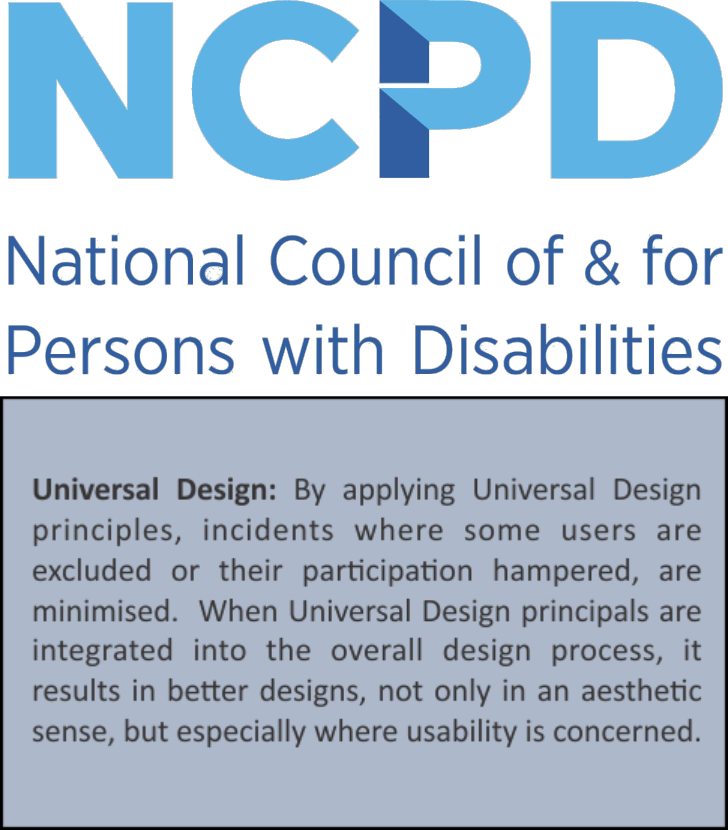
The National Council of and for Persons with Disabilities (NCPD): believe that this can be prevented by applying Universal Design Principals during the design phase and they therefor offer the following services to assist:
- Workshops for architects, developers and other building professionals to develop an understanding of universal design and access.
- Facilitating access audits for new or existing buildings; echo e-access for the natural and communication environment. Audits are followed by a report indicating shortfalls and recommendations.
- Marketing of facilities that are accessible to persons with disabilities
Contact Fanie Swanepoel or Danie Marais for more information on Tel: +27 11 452 2774 or email them on: fanies@ncpd.org.za or danie@ncpd.org.za
QASA: The QuadPara Association of South Africa (QASA) is a non-profit organisation (NPO 000-881) of Quadriplegics and Paraplegics in South Africa. QASA’s mission is “to improve lives by securing resources to advocate, educate, capacitate, support and mobilize”. QASA’s vision is that “all quadriplegics and paraplegics will live their lives to their full potential”. QASA develops products, programmes and services for quadriplegic and paraplegic members to build their capacity and ensure opportunities for societal integration and empowerment.
will live their lives to their full potential”. QASA develops products, programmes and services for quadriplegic and paraplegic members to build their capacity and ensure opportunities for societal integration and empowerment.
These Services include but are not limited to Access Audits:
An access audit is a form of inspection that can be used to assess the ease of access to, and ease of use of an environment (such as a building or landscape), a service, or a facility, by people with a range of access impairments.
Everyone has the right to be able to fully participate within society, and the built environment and accessibility plays a vital role in achieving this goal. Persons with mobility impairments are faced with physical barriers that exclude them from societal integration, be that in the workplace, educational & recreational facilities.
Bearing this in mind it is of utmost importance that we make our spaces accessible, it is not only an issue of equality and justice, but it makes good business sense, and adds to contributing to the development of a more inclusive and equal society.
Access Audits identify features including:
- The current accessibility of the building
- Areas for improvement (e.g. no accessible parking in the car park or the door in the accessible toilet on the ground floor is incorrectly located and therefore the building is inaccessible)
- Good/bad practice in relation to facilities management that an organisation has in place; positive accessibility features (e.g. counter tops at reception, good use of lighting and colour throughout building, signages)
Benefits of Accessible Environment:
- Increases the pool of potential new employees that an employer can tap into
- Retain existing employees who may acquire a disability through an accident / medical condition
- Enables more persons with disabilities to enter the building and /or use the services
- Improves overall safety of buildings, which has a direct impact on the number of accidents taking place and therefore the cost of insurance premiums.
Click on the link above to find out more about "Access Audits", or visit our Organizations - QASA Page to find out more about QASA and the other Projects and Services that they provide, or their website at www.qasa.co.za.
These Organizations and Companies listed above which specialize in Universal Design and Access will follow those standards set by "The National Building Regulations and Building Standards Act" to make sure that persons with disabilities are not excluded from any events, services, information, communication, products and venues due to lack of Accessible Parking Bays.
Parking Bay Regulations
There are a number of other Disabled Parking Bay Regulations, to view all the Disabled Parking Bay Regulations, see below:
4.3.1 For employee parking, at least one parking space shall be accessible for persons with disabilities.
4.3.2 In addition to the requirement of 4.3.1, where provision has been made within a building, or on the site on which such building is erected, for the parking of more than 50 motor vehicles,
- At least one parking space per 25 parking spaces (or part thereof) and at least 20 % of the parking spaces at rehabilitation and medical facilities shall be provided for parking of vehicles used by persons with disabilities.
- The parking spaces provided for vehicles used by persons with disabilities shall be of a suitable length, shall be at least of the dimensions shown in figure 2, and shall be situated on and accessed from a surface that is not steeper than 1:50.
- Any parking space provided for vehicles used by persons with disabilities shall be located within 50 m of an accessible entrance.
- Any parking space provided for vehicles used by persons with disabilities shall be clearly demarcated as being intended for the use of persons with disabilities only;
- Entry and routing to any parking space designated for persons with disabilities shall be provided with a clear height of at least 2,4 m and shall allow for the entry of vehicles suitable for use by wheelchair users, particularly those that have a hoist to carry the wheelchair on top of the car.
4.3.3 Parking spaces shall be identified by a vertical sign incorporating the international symbol for access by persons with disabilities, in accordance with 4.2. The international symbol shall also be clearly painted on the road surface and it shall be 1 000 mm × 1 000 mm.
NOTE: Road signs for persons with disabilities should be provided in accordance with the latest edition of The Southern African Development Community Road Traffic Signs Manual (SADC RTSM) published by the Department of Transport.
Links
- Building Regulations for facilities for Disabled Pdf.
- Standard Electrical, Mechanical And Architectural Guideline For The Design Of Accessible Buildings (Facilities For Disabled Persons)
To find a Service Provider or Organization that can assist you with Services listed on this page, visit our "Services" Search Facility, or visit our Products page to find out more about the Products that are available for you.
